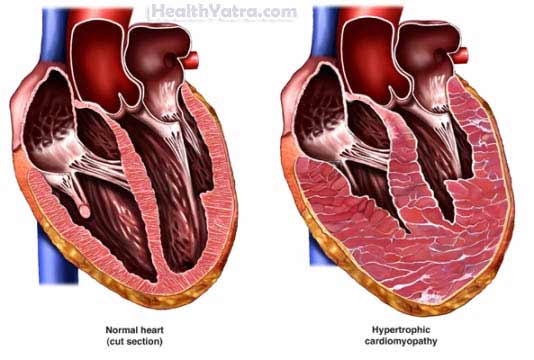تعريف
Hypertrophic cardiomyopathy, or HCM, is a form of cardiomyopathy. This is a condition in which the heart muscle thickens due to genetic problems with the muscle’s structure. As the muscle thickens, it must work harder to pump blood, which strains the heart muscle. Sometimes, the thickened muscle gets in the way of the blood leaving the heart and causes a blockage. This blockage can cause the neighboring heart valve, called the mitral valve, to become leaky. HCM can cause uneven muscle growth which can cause the heart to pump in a disorganized way. Rarely, it can cause abnormal heart rhythms that can even be fatal.
There are three main types of cardiomyopathy:
- Dilated
- Hypertrophic—can be divided into two types:
- Hypertrophic obstructive cardiomyopathy (HOCM)—the muscle between the two valves of the heart becomes so enlarged that it obstructs the blood flow in the heart
- Non-obstructive hypertrophic cardiomyopathy—non-obstructive form, the enlarged muscle is not large enough to block blood flow
- Restrictive
HCM can occur in people of all ages. But, it is usually most severe when it occurs in younger people. The diagnosis is only made in people who do not have other causes of cardiomyopathy (eg, amyloidosis, sarcoidosis, coronary or valvular heart disease, etc.)
Those with HCM are at an increased risk of sudden death. However, many individuals with HCM live a normal, healthy life with very few symptoms.

أسباب
Causes of HCM include:
- A gene that causes the abnormal structure of the heart muscle. It can be inherited or can happen from changes in the genes over time.
- A defective gene that controls growth of the heart muscle
- A viral infection
In people over age 60, HCM is likely to be caused by or related to high blood pressure.
عوامل الخطر
تزيد هذه العوامل من فرصتك في الإصابة بهذه الحالة. أخبر طبيبك إذا كان لديك أي من عوامل الخطر التالية:
- Having a family member with HCM
- Being over age 60 and having hypertension
الأعراض
تشمل الأعراض ما يلي:
- ألم في الصدر
- Fainting, particularly during exercise
- Dizziness or lightheadedness, particularly following exercise
- خفقان القلب
- Shortness of breath or difficulty breathing
- General fatigue
- Tiring easily during exercise or activity
- Shortness of breath when lying down
These symptoms can be caused by some of the side effects of the condition, includingarrhythmias (abnormal heart beats). The blocked or reduced blood flow is usually the cause of symptoms like dizziness, fainting, and difficulty breathing.
التشخيص
سوف يسألك طبيبك عن الأعراض والتاريخ الطبي، وسيقوم بإجراء فحص بدني.
وقد تشمل الاختبارات التالية:
- Stress test —tests how the body responds to exercise, which can help in detecting heart and lung problems
- Echocardiography —uses high-frequency sound waves (ultrasound) to examine the size, shape, and motion of the heart
- Transesophageal echocardiogram —images of the heart are taken to detect abnormalities
- Heart monitor—a portable electrocardiogram (ECG) records continuous heart activity usually over a 24-72 hour period to determine regularity of the heartbeat
- Heart catheter—a catheter is inserted into an artery in the groin area and threaded to the heart chambers
- An x-ray machine shows real-time images of your body as a dye is injected through the catheter. This allows angiograms (photos) to be taken of the blood vessels and the heart.
- تحاليل الدم
- Chest x-ray —uses radiation to take a picture of structures inside the body, especially bones.
العلاج
Treatment focuses on controlling symptoms and preventing complications. Talk with your doctor about the best treatment plan for you. Treatment options include:
الأدوية
Medications may be used to help maintain proper and regular heart function. These may include beta-blockers and calcium channel blockers.
If you have an arrhythmia, you may need anti-arrhythmic drugs. You may also need blood-thinning medication.
جراحة
The thickened portion of the heart muscle is cut and removed. This may be needed if you have a severely blocked blood flow from the heart.
If the mitral valve is leaking, surgery may also be done to repair or replace the mitral valve.
Alcohol Septal Ablation
Alcohol is injected into the arteries of the thickened portion of the heart. This helps to reduce the blockage in the heart and improve blood flow out of the heart.
Implantable Cardioverter Defibrillators (ICD)
This ICD is implanted if you are at heightened risk for sudden death.
الوقاية
To help reduce your chances of getting HCM, take the following steps:
- If you have a family member who has been diagnosed with HCM—you and other family members should be screened for the condition
- If family history puts you at higher risk for HCM—regular echocardiograms may reduce the risk of death or complications from HCM
- If you have high blood pressure—take medications and follow other instructions as directed by your physician.
